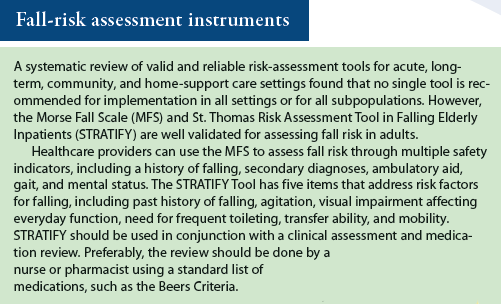The Basic Principles Of Dementia Fall Risk
Table of ContentsHow Dementia Fall Risk can Save You Time, Stress, and Money.Dementia Fall Risk Can Be Fun For AnyoneGetting My Dementia Fall Risk To WorkGet This Report about Dementia Fall RiskDementia Fall Risk for Dummies
The FRAT has three areas: drop danger status, risk factor list, and action strategy. A Loss Danger Standing includes information about history of current drops, medicines, psychological and cognitive standing of the person - Dementia Fall Risk.If the individual scores on a threat variable, the corresponding number of points are counted to the individual's autumn threat score in the box to the much. If a client's autumn threat score completes 5 or greater, the person is at high danger for falls. If the individual scores only four factors or lower, they are still at some danger of dropping, and the nurse ought to utilize their ideal professional evaluation to handle all fall risk variables as component of an alternative care plan.
These conventional approaches, in basic, assist develop a safe setting that minimizes unexpected drops and delineates core preventative procedures for all people. Indications are crucial for patients at danger for drops.
Dementia Fall Risk Things To Know Before You Get This
Wristbands should include the person's last and first name, day of birth, and NHS number in the UK. Just red shade ought to be used to indicate special patient standing.
Items that are as well much may require the client to connect or ambulate needlessly and can potentially be a hazard or contribute to falls. Helps prevent the individual from heading out of bed without any assistance. Nurses reply to fallers' telephone call lights quicker than they do to lights launched by non-fallers.
Visual impairment can considerably create falls. Maintaining the beds closer to the floor reduces the risk of drops and severe injury. Positioning the cushion on the flooring considerably reduces fall danger in some health care setups.
The 3-Minute Rule for Dementia Fall Risk
Patients that are tall and with weak leg muscular tissues who attempt to rest on the bed from a standing setting are likely to drop onto the bed since it's as well reduced for them to reduce themselves safely. If a high patient attempts to obtain up from a reduced bed without assistance, the patient is likely to drop back down onto the bed or miss out on the bed and drop onto the floor.
They're created to advertise timely rescue, not to stop drops from bed. Audible alarm systems can likewise remind the person not to rise alone. Making use of alarm systems can likewise be an alternative to physical restraints. In addition to bed alarm systems, boosted supervision for high-risk people likewise may assist prevent falls.

Clients with an evasion gait increase fall chances significantly. To lower loss danger, shoes must be with a little to no heel, slim soles with slip-resistant tread, and sustain the ankle joints.
The Main Principles Of Dementia Fall Risk
Clients, specifically older adults, have actually minimized visual ability. Illumination an unfamiliar environment aids increase visibility if the individual need to rise at night. In a research, homes with appropriate illumination report fewer falls (Ramulu et al., 2021). Renovation in lights in the house may minimize fall rates in older grownups (Dementia Fall Risk). Using stride belts by all healthcare providers can promote security when assisting individuals with transfers from bed to chair.

Sitters are effective for assuring a safe, protected, and safe atmosphere. Nevertheless, studies demonstrated very low-certainty proof that caretakers minimize fall danger in acute treatment medical facilities and just moderate-certainty that options like video surveillance can decrease sitter usage without increasing fall danger, recommending that caretakers are not as useful as at first thought (Greely et al., 2020).
The Ultimate Guide To Dementia Fall Risk

Raised physical fitness lowers the threat for falls and restricts injury that is suffered when loss takes place. Land and water-based workout programs might be in a similar way useful on balance and gait and thereby decrease the danger for drops. Water workout may add a favorable benefit on balance and stride for women 65 years and older.
Chair Surge Workout is he has a good point a straightforward sit-to-stand exercise that assists enhance the muscles in the upper legs and buttocks and enhances movement and freedom. The goal is to do Chair Increase workouts without using hands as the customer becomes stronger. See sources section for a thorough direction on how to carry out Chair Increase exercise.
Comments on “The Ultimate Guide To Dementia Fall Risk”